#Junta Myanmar
Text
Nearly seven years after the Myanmar military killed thousands of Muslim Rohingyas, in what the UN called "textbook ethnic cleansing", it wants their help.
From interviews with Rohingyas living in Rakhine State the BBC has learned of at least 100 of them being conscripted in recent weeks to fight for the embattled junta. All their names have been changed to protect them.
"I was frightened, but I had to go," says Mohammed, a 31-year-old Rohingya man with three young children. He lives near the capital of Rakhine, Sittwe, in the Baw Du Pha camp. At least 150,000 internally displaced Rohingyas have been forced to live in IDP camps for the past decade.
In the middle of February the camp leader came to him late at night, Mohammed said, and told him he would have to do military training. "These are army orders," he remembers him saying. "If you refuse they have threatened to harm your family."
The BBC has spoken to several Rohingyas who have confirmed that army officers have been going around the camps and ordering the younger men to report for military training.
The terrible irony for men like Mohammed is that Rohingyas in Myanmar are still denied citizenship, and subjected to a range of discriminatory restrictions - like a ban on travel outside their communities.
In 2012 tens of thousands of Rohingyas were driven out of mixed communities in Rakhine State, and forced to live in squalid camps. Five years later, in August 2017, 700,000 fled to neighbouring Bangladesh, after the army launched a brutal clearance operation against them, killing and raping thousands and burning their villages. Some 600,000 of them still remain there.
Myanmar is now facing a genocide trial at the International Court of Justice in the Hague over its treatment of the Rohingyas.
That the same army is now forcibly recruiting them is a telling sign of its desperation, after losing huge swathes of territory in Rakhine recently to an ethnic insurgent group called the Arakan Army. Dozens of Rohingyas in Rakhine have been killed by military artillery and aerial bombardments.
The military has also suffered significant losses to opposition forces in other parts of the country - on Saturday it lost control of Myawaddy, a town on the eastern border with Thailand. Most of the country's overland trade passes through this vital route.
The junta has lost large numbers of soldiers as well. They have been killed, wounded, surrendered or defected to the opposition, and finding replacements is difficult. Few want to risk their lives propping up an unpopular regime.
And the Rohingyas fear that is the reason they are being targeted again - to be cannon fodder in a war the junta seems to be losing.
Mohammed said he was driven to the base of the 270th Light Infantry Battalion in Sittwe. Rohingyas have been prohibited from living in the town since they were driven out during the 2012 communal violence.
"We were taught how to load bullets and shoot," he said. "They also showed us how to disassemble and reassemble a gun."
In a video seen by the BBC another group of Rohingya conscripts can be seen being taught how to use BA 63 rifles, an older standard weapon used by the Myanmar armed forces.
Mohammed was trained for two weeks, then sent home. But after just two days he was called back, and put on a boat with 250 other soldiers and transported five hours up-river to Rathedaung, where a fierce battle with the Arakan Army was under way for control of three hilltop military bases.
"I had no idea why I was fighting. When they told me to shoot at a Rakhine village, I would shoot."
He fought there for 11 days. They were desperately short of food, after a shell fell on their supply hut. He saw several Rohingya conscripts killed by artillery and he was injured by shrapnel in both legs, and taken back to Sittwe for treatment.
On 20 March the Arakan Army released photos from the battle, after it had taken control of the three bases, showing several corpses, at least three of them identified as Rohingyas.
"While I was in the middle of the battle I was terrified the whole time. I kept thinking about my family," Mohammed said. "I never thought I would have to go to war like that. I just wanted to go home. When I got home from the hospital I hugged my mother and cried. It felt like being born again from my mother's womb."
Another conscript was Hussain, from Ohn Taw Gyi camp, which is also near Sittwe. His brother Mahmoud says he was taken away in February and completed his military training, but he went into hiding before they could send him to the front line.
The military denies using Rohingyas to fight its battles with the Arakan Army. General Zaw Min Tun, the junta spokesman, told the BBC that there was no plan to send them to the front line. "We want to ensure their safety, so we have asked them to help with their own defence," he said.
But in interviews with the BBC, seven Rohingyas in five different IDP camps near Sittwe all said the same thing: that they know of at least 100 Rohingyas who have been recruited this year and sent off to fight.
They said teams of soldiers and local government officials came to the camps in February to announce that the younger men would be conscripted, at first telling people they would get food, wages and citizenship if they joined up. These were powerful lures.
Food in the IDP camps has become scarce and expensive as the escalating conflict with the Arakan Army has cut off the international aid supplies. And the denial of citizenship is at the heart of the Rohingyas' long struggle for acceptance in Myanmar, and one reason they suffer systematic discrimination, described by human rights groups as similar to apartheid.
However, when the soldiers returned to take the conscripted men away, they retracted the offer of citizenship. When asked by the camp residents why they, as non-citizens, should be subjected to conscription, they were told that they had a duty to defend the place where they lived. They would be militiamen, not soldiers, they were told. When they asked about the offer of citizenship, the answer was "you misunderstood".
Now, according to one camp committee member, the army is demanding new lists of potential recruits. After seeing and hearing from the first group to come back from the front line, he said, no-one else was willing to risk being conscripted.
So the camp leaders are now trying to persuade the poorest men, and those with no jobs, to go, by offering to support their families while they are away, with donations raised from other camp residents.
"This conscription campaign is unlawful and more akin to forced labour," said Matthew Smith, from the human rights group Fortify Rights.
"There's a brutal and perverse utility to what's happening. The military is conscripting the victims of the Rohingya genocide in an attempt to fend off a nationwide democratic revolution. This regime has no regard for human life. It's now layering these abuses on top of its long history of atrocities and impunity."
By using Rohingyas in its battles against the advancing Arakan Army, the Myanmar military threatens to reignite communal conflict with the ethnic Rakhine Buddhist population, much of which supports the insurgents.
It was friction between the two communities which in 2012 caused the expulsion of tens of thousands of Rohingyas from towns like Sittwe. In 2017, ethnic Rakhine men joined in the army's attacks on the Rohingyas.
Tension between the two communities has eased since then.
The Arakan Army is fighting for an autonomous state, part of a wider campaign with other ethnic armies and opposition groups to overthrow the military junta and create a new, federal system in Myanmar.
Now on the brink of victory in Rakhine State, the Arakan Army has talked about giving citizenship to all who have lived there recently, implying that it might accept the return of the Rohingya population from Bangladesh.
The mood has now changed. A spokesman for the Arakan Army, Khaing Thukha, told the BBC that they viewed Rohingyas being conscripted to fight for the junta as "the worst betrayal of those who had recently been victims of genocide, and of those fighting for liberation from dictatorship".
Pro-military media have also been giving publicity to what appear to have been Rohingya protests in Buthidaung against the Arakan Army, although local people told the BBC they suspected these were organised by the army in an attempt to divide the two groups.
The Rohingyas are now forced to fight for an army that does not recognise their right to live in Myanmar, thereby alienating the ethnic insurgents who may soon control most of Rakhine. Once targeted by both, they are now caught between the two sides.
Mohammed has been given a certificate by the army, stating that he has fought in battle on their side. He has no idea what value it has, nor whether it exempts him from further military service. It could well get him into trouble with the Arakan Army if it continues its advance towards Sittwe and his camp.
He is still recovering from his injuries, and says he is unable to sleep at night after his experience.
"I'm afraid they will call me again. This time I came back because I was lucky, but next time I am not sure what will happen."
92 notes
·
View notes
Text

Nope, today’s not a public holiday. The people of Myanmar are taking part in a “silent strike” by staying home between 10am and 3pm as a show of solidarity with the movement to restore civilian rule to the country.
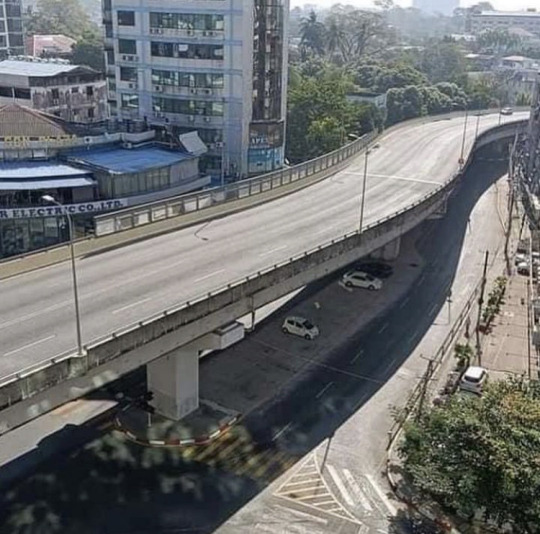
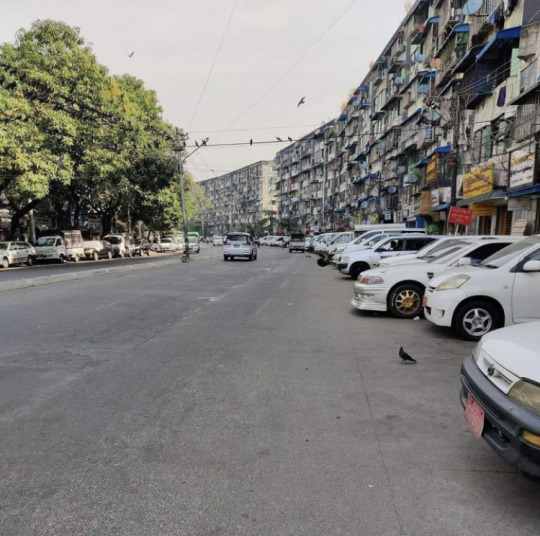
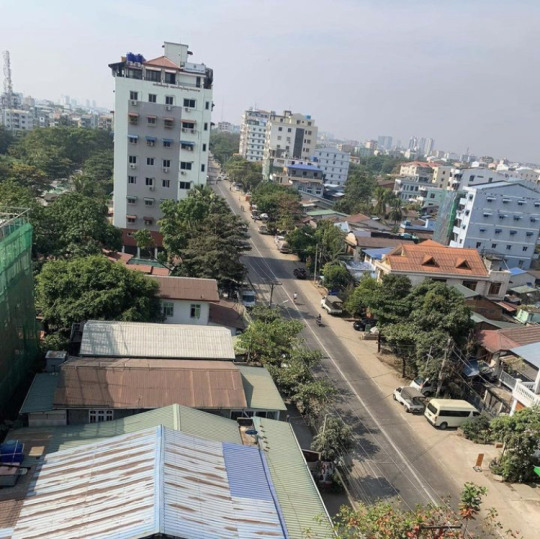
#ourcityourrules
#whatshappeninginmyanmar
#hearthevoicesofmyanmar
Humans of Myanmar
Full bellies for life
#myanmar#burma#coup#what’s happening in myanmar#whatshappeninginmyanmar#burmese#protest#se asia#dictatorship#military#junta
124 notes
·
View notes
Text
UN: Myanmar’s war leaves 6 million children in need
Cut off from food, medicine and education, children bear the brunt of grown-ups’ war.
By RFA Burmese
2024.01.03
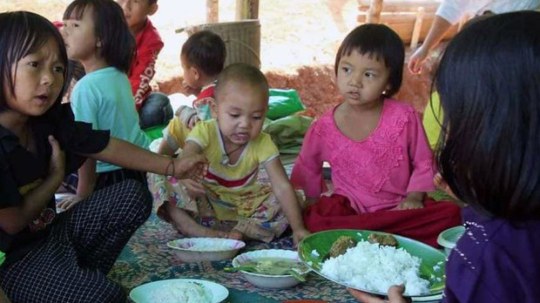
Karenni State IDP Assistance Network
As conflict rages on in Myanmar’s northwestern Chin state, a mother who lives in the conflict area struggles to find food and medicine for her children.
“When there are fights like this, I worry that my children will be harmed,” she told RFA Burmese on condition of anonymity for security reasons.
“Even if you have money, you can’t buy anything because roads are being blocked. That’s why I’m worried that I won’t be able to feed my children,” she said. “I’m worried about something that will happen to them because I can’t do anything for them.”
Their story is common in Myanmar these days as a result of fighting that has raged since the February 2021 coup, according to the United Nations’ Office for the Coordination of Humanitarian Affairs, or OCHA.
“Three years on from the military takeover, the humanitarian landscape for 2024 is grim with a third of the population – 18.6 million people – now estimated to be in humanitarian need,” OCHA said in its recently published Humanitarian Needs and Response Plan for Myanmar.
“Children are bearing the brunt of the crisis with 6 million children in need as a result of displacement, interrupted health-care and education, food insecurity and malnutrition, and protection risks including forced recruitment and mental distress.”
Hungry children
For the mother in Chin state, the chaos has meant an interruption in not only regular supplies of food, it has also meant that routine vaccinations have stopped for her children.
Another mother, from Shan state in the east, expressed similar concerns for her three children. They currently live at an internally displaced persons’ camp in Hseni township.
“In terms of food, in the refugee camp, we were only fed two meals a day, and the children were hungry at noon,” she said. “The situation is like that. And in terms of living, I don’t have to stay at home. I feel that it is not safe for the children because we have to live in dormitories or under tarps.”
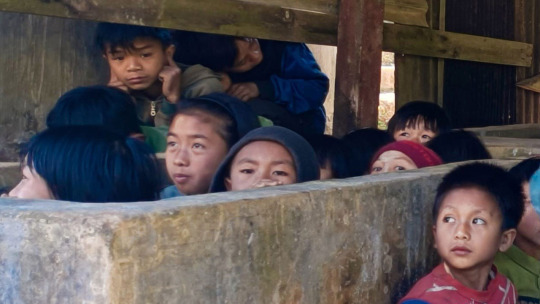
A person helping displaced people in northern Shan state said that children are being affected by the fighting all over the region.
“They have difficulties accessing education,” the helper said. “Children, especially, suffer from severe emotional distress. Some under-aged children were recruited [to fight], and some have even been killed and wounded in the conflict. Nobody can work because battles are raging everywhere. So there is no food security.”
He said that he would like to ask armed organizations not to recruit the children, especially minors.
Since malnutrition in a child can affect the mental, emotional, and physical well-being, this problem must be dealt with urgently, Lwan Wai, a Yangon-based member of the Civil Disobedience Movement Medical Network, told RFA.
“After the coup, it has become much worse,” said Lwan Wai. “Malnutrition of children affects both their physical and mental health, and it will hugely affect their brain development and thinking ability when they become adults. That’s why this is an issue that must be dealt with urgently in our country. This is very important.”
In UNOCHA’s humanitarian fund proposal for 2024 released on Dec. 11, it stated that $994 million in funding is needed to reach Myanmar’s 5.3 million people with food, water, shelter, health care and protection.
Translated by Htin Aung Kyaw. Edited by Eugene Whong and Malcolm Foster.
2 notes
·
View notes
Text
youtube
#Russia#UkraineRussiaWar#Ukraine#Putin#Zelensky#MoscowAttack#DroneAttack#Lebanon#Pakistan#PakistanBlast#Niger#Myanmar#Thailand#Mali#coup#junta#Burma#Youtube
2 notes
·
View notes
Text
The pro-democracy movement in Myanmar continues to challenge the junta which grabbed power in a coup in February 2021. The opposition government, ethnic armed groups, urban activists, and exiled media are all demanding the end of the military dictatorship, restoring civilian leadership, and reviving the nation’s transition to democratic rule.
Despite the mass arrests and violence, opposition against the junta continues to garner public support as seen in the coordinated “silent strike” across the country. Activists either joined the armed resistance in rural communities or sustained the opposition in urban centers.
Through the help of a solidarity network, Global Voices interviewed the Yangon Revolution Force (YRF) and the Artists Collective about the status and prospect of the urban struggle against the junta.
2 notes
·
View notes
Link
Brutal acts by humanity still continues, causing the victims agony and spreading sadness among families of victims, their friends and others.
They have been probably undergone by the individuals under an "authoritarian system".
4 notes
·
View notes
Text
Myanmar airstrike kills 100
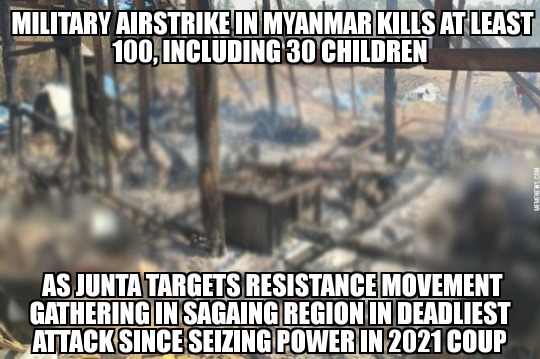
View On WordPress
2 notes
·
View notes
Quote
As the Burmese military junta wilts under growing global pressure, collapsing economy and mounting insurgencies, it will draw closer to China, which strongly backs the junta. The military regime has already cleared 15 mega infrastructure projects funded by China since the February 2021 coup, drawing Myanmar into a substantial Chinese debt trap. The Burmese generals are totally dependent on Chinese support to protect their back at the UN and in other global forums. With the Chinese entrenching themselves firmly in Myanmar’s economy and defence sectors, Indian worries over the security implications for its sensitive Northeast will grow.
Subir Bhaumik, ‘Myanmar issue bad news for act East thrust’, Indian Express
3 notes
·
View notes
Text


#yea p much#like look i don't play sufferings olympics#and this is really not to say that the roe ruling was ok#but like the tags said...there is literally a war going on#people in myanmar have been fighting their military juntas for almost 1.5 years now#where i live. you can't call out and criticise the gov like yall do in the us. because 'inciting hatred towards the gov' is a harshly#punishable crime#and yes that law is enforced sometimes very enthusiastically too#look i'm not saying that yall can't complain. yall should.#but bear in mind that when you make a post on tumblr. this is a public and INTERNATIONAL forum#keep things in perspective please.#it sucks but it is frankly inaccurate to portray as if things are uniquely bad#to delete#maybe
3 notes
·
View notes
Text
A deadly stampede outside a passport office that took two lives and unending lines outside embassies - these are just some examples of what has been happening in Myanmar since the announcement of mandatory conscription into the military.
Myanmar's military government is facing increasingly effective opposition to its rule and has lost large areas of the country to armed resistance groups.
On 1 February 2021, the military seized power in a coup, jailing elected leaders and plunging much of the country into a bloody civil war that continues today.
Thousands have been killed and the UN estimates that around 2.6 million people been displaced.
Young Burmese, many of whom have played a leading role protesting and resisting the junta, are now told they will have to fight for the regime.
Many believe that this is a result of the setbacks suffered by the military in recent months, with anti-government groups uniting to defeat them in some key areas.
"It is nonsense to have to serve in the military at this time, because we are not fighting foreign invaders. We are fighting each other. If we serve in the military, we will be contributing to their atrocities," Robert, a 24-year-old activist, told the BBC.
Many of them are seeking to leave the country instead.
"I arrived at 03:30 [20:30 GMT] and there were already about 40 people queuing for the tokens to apply for their visa," recalled a teenage girl who was part of a massive crowd outside the Thai embassy in Yangon earlier in February. Within an hour, the crowd in front of the embassy expanded to more than 300 people, she claims.
"I was scared that if I waited any longer, the embassy would suspend the processing of visas amid the chaos," she told the BBC, adding that some people had to wait for three days before even getting a queue number.
In Mandalay, where the two deaths occurred outside the passport office, the BBC was told that there were also serious injuries - one person broke their leg after falling into a drain while another broke their teeth. Six others reported breathing difficulties.
Justine Chambers, a Myanmar researcher at the Danish Institute of International Studies, says mandatory conscription is a way of removing young civilians leading the revolution.
"We can analyse how the conscription law is a sign of the Myanmar military's weakness, but it is ultimately aimed at destroying lives... Some will manage to escape, but many will become human shields against their compatriots," she said.
Myanmar's conscription law was first introduced in 2010 but had not been enforced until on 10 February the junta said it would mandate at least two years of military service for all men aged 18 to 35 and women aged 18 to 27.
Maj-Gen Zaw Min Tun, the spokesperson for the military government, said in a statement that about a quarter of the country's 56 million population were eligible for military service under the law.
The regime later said it did not plan to include women in the conscript pool "at present" but did not specify what that meant.
The government spokesperson told BBC Burmese that call-ups would start after the Thingyan festival marking the Burmese New Year in mid-April, with an initial batch of 5,000 recruits.
The regime's announcement has dealt yet another blow to Myanmar's young people.
Many had their education disrupted by the coup, which came on top of school closures at the height of the Covid-19 pandemic.
In 2021, the junta suspended 145,000 teachers and university staff over their support for the opposition, according to the Myanmar Teachers' Federation, and some schools in opposition-held areas have been destroyed by the fighting or by air strikes.
Then there are those who have fled across borders seeking refuge, among them young people looking for jobs to support their families.
In response to the conscription law, some have said on social media that they would enter the monkhood or get married early to dodge military service.
The junta says permanent exemptions will be given to members of religious orders, married women, people with disabilities, those assessed to be unfit for military service and "those who are exempted by the conscription board". For everyone else, evading conscription is punishable by three to five years in prison and a fine.
But Robert doubts the regime will honour these exemptions. "The junta can arrest and abduct anyone they want. There is no rule of law and they do not have to be accountable to anyone," he said.
Wealthier families are considering moving their families abroad - Thailand and Singapore being popular options, but some are even looking as far afield as Iceland - with the hope that their children would get permanent residency or citizenship there by the time they are of conscription age.
Others have instead joined the resistance forces, said Aung Sett, from the All Burma Federation of Student Unions, which has a long history of fighting military rule.
"When I heard the news that I would have to serve in the military, I felt really disappointed and at the same time devastated for the people, especially for those who are young like me. Many young people have now registered themselves to fight against the junta," the 23-year-old told the BBC from exile.
Some observers say the enforcement of the law now reveals the junta's diminishing grip on the country.
Last October, the regime suffered its most serious setback since the coup. An alliance of ethnic insurgents overran dozens of military outposts along the border with India and China. It has also lost large areas of territory to insurgents along the Bangladesh and Indian borders.
According to the National Unity Government, which calls itself Myanmar's government in exile, more than 60% of Myanmar's territory is now under the control of resistance forces.
"By initiating forced conscription following a series of devastating and humiliating defeats to ethnic armed organisations, the military is publicly demonstrating just how desperate it has become," said Jason Tower, country director for the Burma programme at the United States' Institute of Peace.
Mr Tower expects the move to fail because of growing resentment against the junta.
"Many youth dodging conscription will have no choice but to escape into neighbouring countries, intensifying regional humanitarian and refugee crises. This could result in frustration growing in Thailand, India, China and Bangladesh, all of which could tilt away from what remains of their support for the junta," he said.
Even if the military does manage to increase troop numbers by force, this will do little to address collapsing morale in the ranks. It will also take months to train up the new troops, he said.
The junta had a long history of "forced recruitment" even before the law was enacted, said Ye Myo Hein, a global fellow at the Woodrow Wilson International Center for Scholars.
"So the law may merely serve as a facade for forcibly conscripting new recruits into the military. With a severe shortage of manpower, there is no time to wait for the lengthy and gradual process of recruiting new soldiers, prompting [officials] to exploit the law to swiftly coerce people into service," he said.
Even for those who will manage to escape, many will carry injuries and emotional pain for the rest of their lives.
"It has been really difficult for young people in Myanmar, both physically and mentally. We've lost our dreams, our hopes and our youth. It just can't be the same like before," said Aung Sett, the student leader.
"These three years have gone away like nothing. We've lost our friends and colleagues during the fight against the junta and many families have lost their loved ones. It has been a nightmare for this country. We are witnessing the atrocities committed by the junta on a daily basis. I just can't express it in words."
83 notes
·
View notes
Text
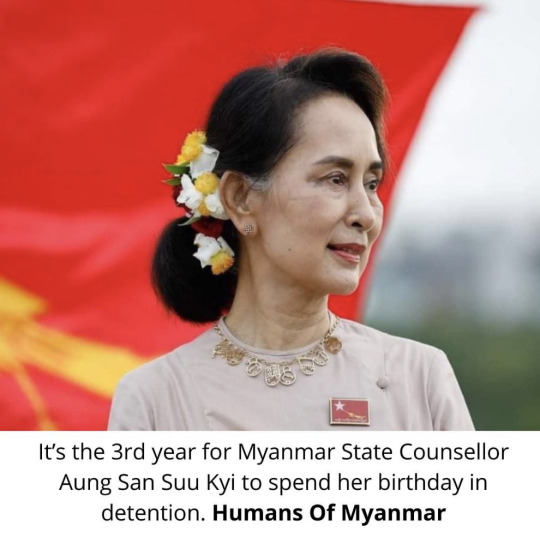
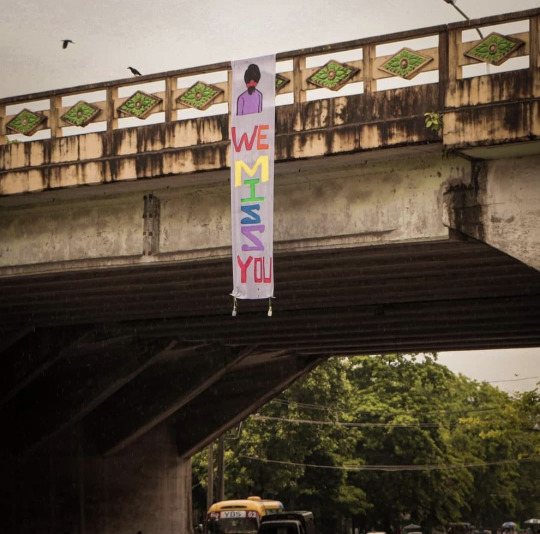
From Humans of Myanmar:
Today, State Counsellor Aung San Suu Kyi celebrates her 78th birthday, which unfortunately also marks her third consecutive birthday spent in detention following the military coup in 2021.
To honor her on this day, a #flowerstrike took place in the country, and a banner expressing the sentiment "We Miss You" was displayed from a bridge located in Yangon.
Additionally, it has been reported that the military council has been arresting individuals who choose to adorn their hair with flowers as a symbol of solidarity.
Let us continue to stand united, work towards justice, and strive for the day when she is released and can contribute to the progress and prosperity of Myanmar once again. 🇲🇲
#myanmar#Burma#Burmese#aung san suu kyi#se asia#dictatorship#coup#military#junta#whatshappeninginmyanmar#what’s happening in myanmar#strike#protest#humans of myanmar
14 notes
·
View notes
Text
Myanmar rebel alliance reached ceasefire with ruling military
A rebel alliance in northern Myanmar has agreed to a ceasefire with the ruling military in talks brokered by China.
The military toppled Myanmar’s government in 2021. Since late October, they have been battling an alliance of ethnic minority armies fighting to end control over their regions.
The standoff has taken place along the northern border with China. The alliance’s joint offensive has raised concerns in China about possible disruptions to border trade and an influx of refugees.
A leader of one rebel group, the TNLA, reported Friday that the Three Brotherhood Alliance and the military had agreed to “cease fire without advancing further.”
Read more HERE
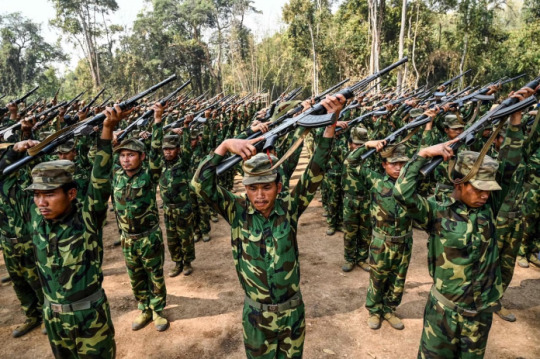
#world news#world politics#news#myanmar#myanmar civil war#myanmar junta#myanmar military#china news#china#china politics#chinese politics
0 notes
Text
Daily Briefing in Relation to the Military Coup
Posted on January 4, 2024
Posted in Daily Briefing since Coup
Since the 1 February 2021 coup, a total of (4,279) people, including pro-democracy activists and civilians have been killed by the junta and pro-military groups during the Spring Revolution. In addition to the total fatality figure, AAPP has documented around (750) deceased persons whose names are unknown and still need to be verified.
Since the coup, a total of (25,749) people have been arrested by the junta in relation to its seizure of power, (19,929) are currently in detention, (8,469) of whom are serving sentences.
There are a total of (119) post-coup death row prisoners as of 4 January 2024. (119) people have been sentenced in absentia, of whom (43) have been sentenced to death. This makes a total of (162) people who have been sentenced to death. (5,820) people have already been released.
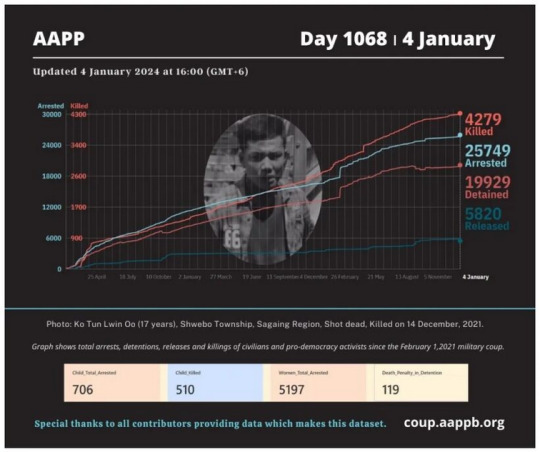
1 note
·
View note
Text
TL Kontinua Kondena Konflitu Armadu iha Gaza-Ukránia Inklui Junta Militár Myanmar
Hatutan.com, (28 Novembru 2023), Díli—Prezidente Repúblika (PR), José Ramos-Horta aborda pontu tolu ne’ebé esensiál iha konjuntura internasionál, ne’ebé sai hanesan dezafiu verídiku bá komunidade internasionál, espesiálmente ba sira ne’ebé partilla Timor-Leste nia ideál sira bá liberdade, independénsia, Estadu Direitu, Demokrasia no soberania.
Continue reading Untitled

View On WordPress
0 notes
Text
Zere voetjes in Myanmar en het gevolg, een ReisKunst-verhaal
Hoe zere blote voeten kunnen leiden tot een olieverfschilderij dat is gebaseerd op indrukken uit Myanmar. Toos van Holstein legt dat uit in deze aflevering van haar serie ReisKunst-verhalen in TOOS&ART. #kunst #art #expo
Daar zat ik dan, met m’n blote, zere voeten. Onder een schaduwrijke boom, met mijn rug tegen de stam. Goed beschermd tegen de brandende zon van Myanmar . Bovenop de top van die piekende rots van de foto hierboven. Met als bebouwing een uitgebreid boeddhistisch tempelcomplex om me heen. Wat dat met een ReisKunst-uiting van mij heeft te maken? Lees verder.
een sfeerbeeld
Myanmar, waar levensgezel…

View On WordPress
#Aung San Suu Kiy#Azië#Birma#blote voeten#Boeddha#Boeddhisme#corruptie#democratie#heiligen#junta#leger#machthebbers#Myanmar#tempel#tempelcomplex#tussenstation#voetzool#westers
0 notes
Text
Myanmar military executes four
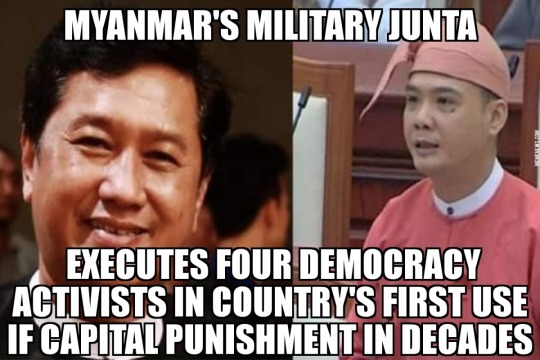
View On WordPress
#asia#capital punishment#democracy#execution#human rights#junta#ko jimmy#meme#memes#military#Myanmar#news#Phyo Zeya Thaw
9 notes
·
View notes